#accessibility of knowledge
Explore tagged Tumblr posts
Text
PLEASE go listen to some of Ismatu Gwendolyn’s podcasts episodes, they read their essays out loud in a very understandable manner, speak about activism, education, literature, culture, society and such subjects.
Threadings on Spotify
Their website
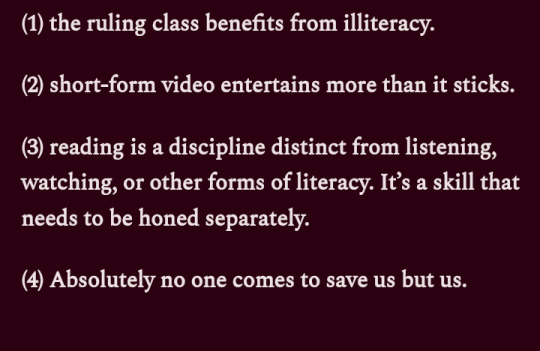
"Absolutely no one comes to save us but us."
Ismatu Gwendolyn, "you've been traumatized into hating reading (and it makes you easier to oppress)", from Threadings, on Substack [ID'd]
#threadings#accessibility of knowledge#ismatu gwendolyn#essays and articles#youve been traumatized into hating reading and it makes you easier to oppress
185K notes
·
View notes
Text
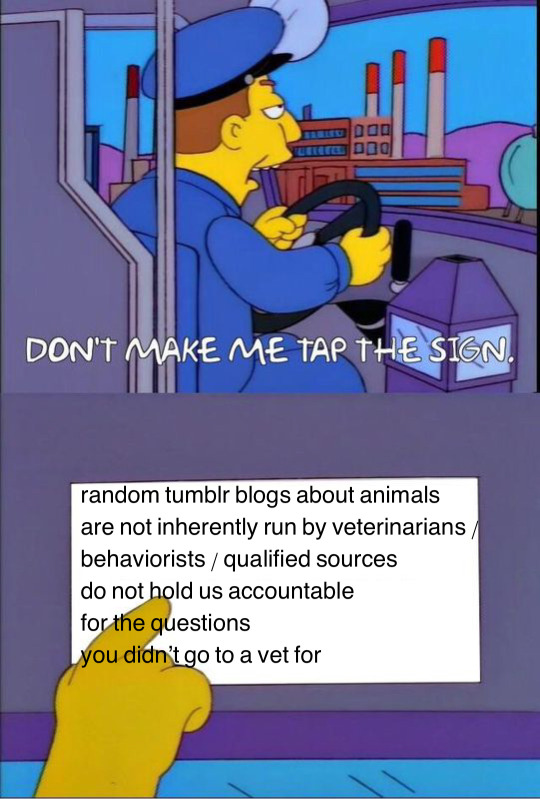
#i have a degree in environmental science and im very knowledgeable about birds however this does not mean i have an easy access encyclopedia#Of bird afflictions#In my brain
9K notes
·
View notes
Text

"Publishers accused the nonprofit of infringing copyrights in 127 books from authors like Malcolm Gladwell, C.S. Lewis, Toni Morrison, J.D. Salinger and Elie Wiesel, by making the books freely available through its Free Digital Library.
The archive, which hosts more than 3.2 million copies of copyrighted books on its website, contended that the library was transformative because it made lending more convenient and served the public interest by promoting "access to knowledge.""
source 1
source 2
source 3
#destiel meme news#destiel meme#news#united states#us news#world news#internet archive#copyright#copyright law#copyright infringement#bookblr#protect access to knowledge#wayback machine#learning is a right#hachette v internet archive#hachette book group#penguin random house#harpercollins#wiley#open library#national emergency library#fair use#controlled digital lending
1K notes
·
View notes
Text
and what if i pulled myself together and contacted the local riding school to tell them i'm interested in joining ....
#but i'm Scared#it's a pretty big one and i'm afraid that it's snobby#i would like to somehow communicate to them that i have baggage and may not be a typical case :'(#on a knowledge and skill basis i could join a group at a higher level#but i doubt my body (or my mind) would handle it and i'd feel safer in a group just above beginner level#there's also the whole being poor and not having a car thing - but this one just so happens to be accessible by bus :')#idk anyone in my life who has such a complicated relationship to horses#they're an open wound in my life and my biggest regret is quitting all those years ago ... things would've been SO different if i didn't#i've cried about this a lot lately and maybe it's time to do something about it#delete later maybe#i'm talking into the void but i don't really have anywhere else
175 notes
·
View notes
Text
do you ever think about how we have phannies in every field? like we have doctors and baristas and mental health therapists and geologists and audiologists and engineers and neuroscientists and authors and social media consultants and activists and child care workers and museum managers and teachers and biologists and emts and linguists and accessibility coaches and sign language interpreters and artists and musicians and editors and actors and chefs and fucking EVERYTHING. not to mention the specific knowledge bases and hobbies we have outside of our professions—coding, linguistic and cultural diversity, artistic creativity, political/social awareness, passion for justice, research, make up and hair and fashion design, media literacy, philosophy, all of our special interests/hyperfixations, etc. we could run a successful commune no problem at all. we’re so smart and talented and resourceful and powerful.
the phandom is rooted in a past of being infamously shitty, and i do see yall slipping back into old habits sometimes (mostly on twitter but sometimes here and you know it <3) but it’s pretty fucking cool how capable this community is and our ability to unify. anyway phanmune when.
(if you want, leave your knowledge base/skills in the tags or replies. can be profession, hobby, major/program of study, what you study in your free time, what you want to learn about, what you’re interested, all of the above, anything)
#this is me having a commie fantasy about liberation#i want this so bad i want COMMUNITY#I WANNA LIVE IN A COMMUNE IN THE WOODS#anyway here’s my resume:#i have a psych bachelors degree and am in a mental health counseling program#i have been a crisis worker for two years and working in mental health in general for longer than that#i also have extensive knowledge of philosophy and politics#and i kick fucking ass at languages#can converse in 6 language and have a level of understanding and/or knowledge in 8 languages#i’m experienced and knowledgable in accessibility and#activism and i’m a writer and musician#and have been taking care of animals professionally for 8 years#i do NOT have proficiency in microsoft word or excel or powerpoint i am completely lying about that on my resume#dnp#dan and phil#phan#dan howell#daniel howell#amazingphil#phil lester#d&p#dip and pip#danisnotonfire#danandphilgames#yeet my deet#yeet my deenp#phstudy
280 notes
·
View notes
Text

📚 At JSTOR, we believe in advancing literacy and making knowledge accessible to all. Explore our vast collection of scholarly articles, books, and primary sources in ways that work for you:
Open access: A growing selection of free content available to everyone.
Institutional access: Many universities, colleges, and schools provide JSTOR access for students, faculty, and alumni.
Public library access: Check with your local #Library for JSTOR access and support your lifelong learning journey.
Register & read: Create a free account to read select articles each month.
JPASS: Paid individual access to an expanded library of content.
Learn more about accessing JSTOR.
Image: A Philosopher Reading. Oil Painting. n.d. Wellcome Collection.
258 notes
·
View notes
Text
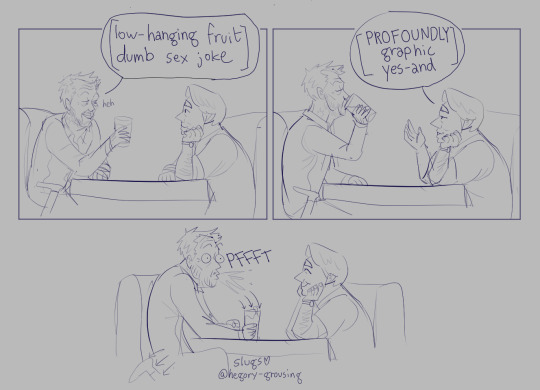
im not a writer so this doesn't have real dialogue. mad libs I guess. I imagine this happens often on their lunch dates hehe
#house#house md#house md fanart#hate crimes md#greg house#james wilson#wilson#hilson#house x wilson#fanart#sillyposting#slugs art#slugs posts#oh hey. im trying to write image descriptions for my art more consistently and I am open to feedback cause I don't really know what im doin#if you use image descriptions/are knowledgeable and you notice something amiss or have suggestions please feel free to tell me#cause I'd like to make my stuff as accessible as I can!#will go back and add descriptions to all my old art at some point. maybe tomorrow
1K notes
·
View notes
Text
one trc opinion i have that i don't really have an entire explanation for is that i think blue and henry are the only characters with like a normal knowledge of pop culture. like they've seen movies they've heard music. henry definitely more than blue but despite the fact that blue's tastes would be more weird I DO think she knows about more mainstream things. she has heard top 40 radio she has watched a disney channel movie she is capable of making references. everyone else on the other hand? gansey is not aware of anything that came into being this century. adam gives strong 'doesn't listen to music' energy. you ask him what he likes and he's like i don't know. i just don't listen to music. ronan is probably the most perplexing case because we already know he had a weird fucking childhood in which he only read alice in wonderland (and i believe it) and YET in his routine in cdth he has a designated 'movie night'. WHAT movies is he watching! i simply refuse to believe this man is capable of making a Reference. at least not a normal one. he'll just cite whatever irish myth his dad told him about as if everyone else is gonna be like oh you're so right ronan this is JUST like that part in the táin bó cúailnge. am i making any sense tonight ladies. gansey does not know who taylor swift is
#in adam's case its partly due to the fact that engaging in pop culture is just not always financially accessible#and i don't think he would have grown up with much of a connection to it#and with blue she's limited by the fact that she presumably has no social media#so would only know stuff that would naturally reach you in a small southern town#henry on the other hand has by far the most knowledge. he knows about celebrity twitter beefs#i think if you reference the karlie kloss camp met gala tweet he'll immediately know what you're on about#trc#the raven cycle
302 notes
·
View notes
Text
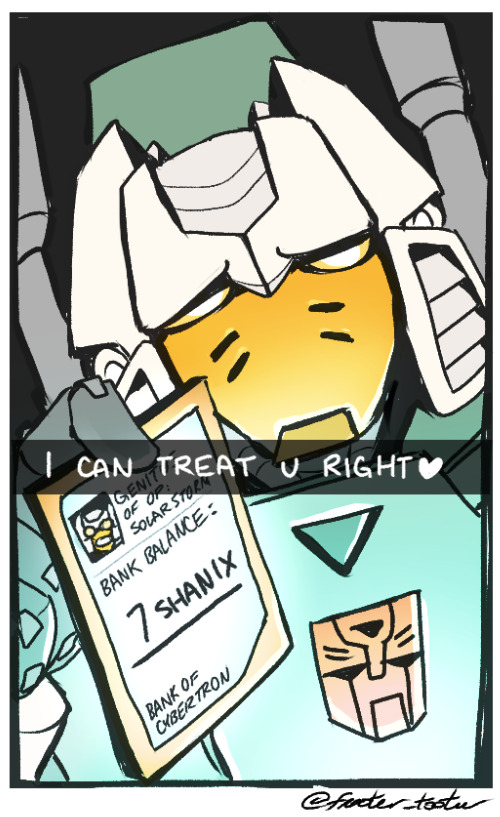
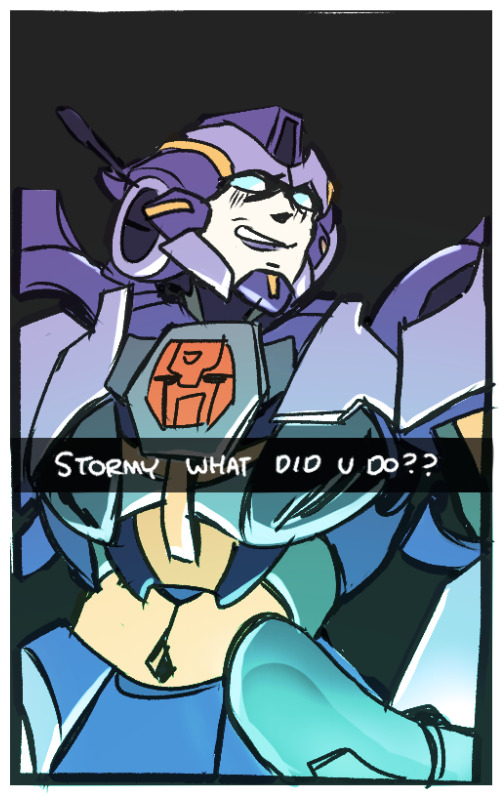

Brainstorm’s the kinda guy to not know what the state of the Cybertronian economy is like at any given time
Original joke credits go to @toyotacorolla2008 !
#mtmte spoilers in tags#I like to think Brainstorm could've just bought the stuff he needed for the time machine#but his lack of knowledge surrounding anything money related caused him to think it wasn't an option#so he ended up joining the cons because THAT would be more accessible to him somehow#he's just a silly guy#mtmte#transformers#maccadam#maccadams#tf idw#transformers fanart#frootertooter archive#more than meets the eye#brainstorm#nautica#perceptor#stormceptor#simpatico#lost light#LL
2K notes
·
View notes
Text
hot take on billford is that the secret third thing is obsession with being seen by someone for the first time in each of their lives
#like actually seen#its been sitting in me#pondering what the third thing felt like#and its like when you think you love something or someone because it completely takes up the space in your brain#and especially when that person or thing can awknowledge your feelings#and thats what they were for each other#on their first meeting they were already finishing eachothers sentences#and i feel like thats when the codependency sunk the first seed#a lonely man in love with knowledge and a lonely eldrich being that has the access to it all#like why would bill lie about the portal if not scared of losing ford#ford is the only dude to reach out to him#who see him as godsent and not a monster#something bill never knew he needed until it was too late#im ripping things apart with my teeth#take my phone away from me#the book of bill#billford#bill cipher#stanford pines#gravity falls#not platonic not romantic but a secret third thing
184 notes
·
View notes
Text
Rewatching TFA, for the hundredth time in a row, and I've got to say. I used to think Sari was, kind of annoying, during my first initial watch and sometimes. The things she does makes me go wide-eyed and gripping at the screen going, "WHAT ARE YOU DOING!?"
But then now, as I'm rewatching it hundreds of times over. I have to physically remind myself that she is a child.
And not only that, but she was a child that was BARELY raised properly. She didn't have other children to socialize around, she had a robot teacher, a robot dog companion, and her occasionally in her life father who was busy manufacturing robots, entertaining the ideas of tours and etcetera.
So maybe, yes. I can definitely understand why she does rash things, and act the way she does. I understand why she's seen as a social outcast amongst other groups of kids (like in the show, ON HER BIRTHDAY).
And I'm not as mad as her, as anybody should be for a child who was raised/taught the wrong things or having not been taught at all.
However...
THIS GUY.
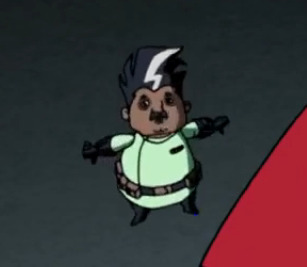
IS A WHOLE 'NOTHER CASE.
I JUST WANNA-
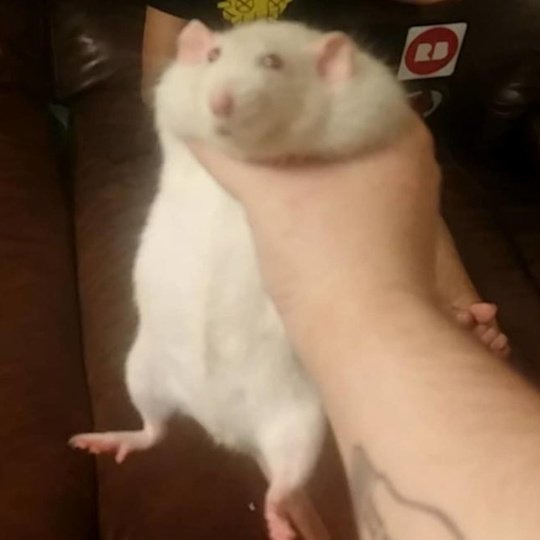
#tfa isaac sumdac#isaac sumdac I am giving you a HARD side-eye#I understand how much of an overworked father he was and I can understand he IS trying at some capacity at his best to raise a child#Given that he never initially asked for one- one just kinda... Landed in his yard.#BUT GOODD GODDDDDDDD.........#My knowledge of psychology has me doing CIRCLES around the walls of my brain watching Sari act the way she did.#IM NOT EVEN THAT MAD THAT SHE DECIDED TO RIP OUT THE WIRES TO THE SHIP TO TRY AND STOP OPTIMUS N HIS GANG FROM LEAVING#I BLAME IT ONNN SUMDAC...#LIKE... FOR HOW MANY YEARS... WAS THIS GOING ON BEFORE SHE LIKE... ACTUALLY GOT ACCESS TO THE KEY AND IT MANUALLY 'grew' HER UP???#If I was ever a character in TFA... And I knew all this. I'd be throwing hands with Sumdac I'm sorry#transformers#tfa sari sumdac#tfa sari#sari#sari sumdac#tfa#transformers animated#maccadams#macaddam#Between Miko and Sari. I kind of understand Sari more. Miko's another case that I wish.. Explored more of her background because maybe then#I'd understand it a little more? Who knows. Maybe I need to rewatch Prime too#I have no doubt that he loves Sari ofc. There was literally several episodes of him trying to reconcile that with his daughter#ANd proving how much he loved her to the point of sacrifice#But I wanna know what was going through his head prior to allat#Isaac is a special case to me of fathers who tried their best given the environment and conditions and resources they had.
83 notes
·
View notes
Text
bauhauzzo has near-omniscience over the past, click clack can percieve everything happening in the present, and huzzle has prescience over all possible futures. send tweet
#great god grove#not a new thought i just like the idea of a past/present/future dichotomy between these three#i suppose you can say click clack also has some comprehension of the past as well (stories) but it's not a very complete knowledge#as he only has access to what's necessary to tell the stories that are still in need of editing#bauhauzzo can straight up remember everything since after he was ascended. and i also believe he can read other's memories#meanwhile huzzle is always looking forwards. it's realm is made of the sands of time which shift and flow in ways unpredictable to mortals#but perfectly traceable to itself. it knows best as anyone that set paths don't exist#anyways all this to say i think these three regularly get into long conversations where their vastly different ways of percieving time#and events is a main point of contention. and sometimes they need to seek each other out to refresh their perspective
62 notes
·
View notes
Text
About the entanglement of "science" and Empire. About geographic imaginaries. About how Empire appeals to and encourages children to participate in these scripts.
Was checking out this recent thing, from scavengedluxury's beloved series of posts looking at the archive of the Budapest Municipal Photography Company.
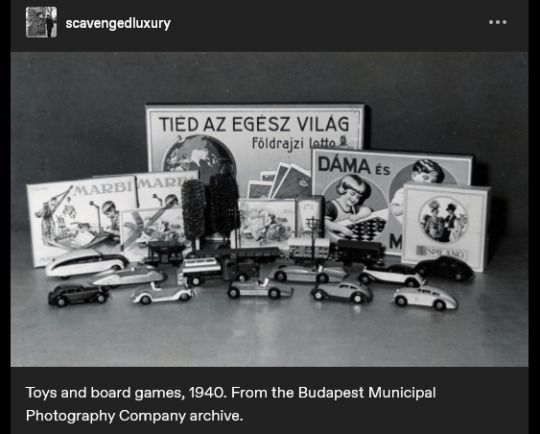
The caption reads: "Toys and board games, 1940."
And I think the text on the game-box in the back says something like "the whole world is yours", maybe?
(The use of appeals to science/progress in imperial narratives probably already well-known to many, especially for those familiar with Victorian era, Edwardian era, Gilded Age, early twentieth century, etc., in US and Europe.)
And was struck, because I had also recently gone looking through nemfrog's posts about the often-strange imagery of children's material in late nineteenth- and early twentieth-century US/Europe. And was disturbed/intrigued by this thing:
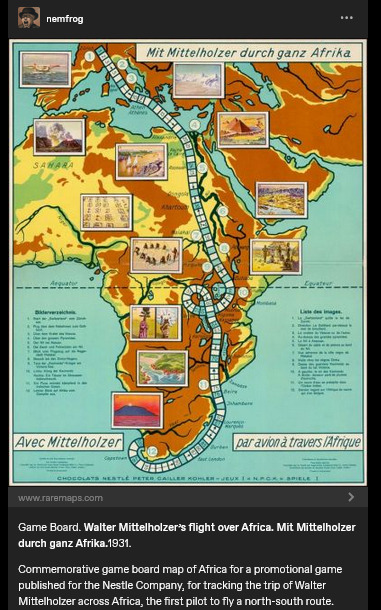
Caption here reads: "Game Board. Walter Mittelholzer's flight over Africa. [...] 1931. Commemorative game board map of Africa for a promotional game published for the N*stle Company, for tracking the trip of Walter Mittelholzer across Africa, the first pilot to fly a north-south route."
Hmm.
"Africa is for your consumption and pleasure! A special game celebrating German achievement, brought to you by the N*stle Company!"
1930s-era German national aspirations in Africa. A company which, in the preceding decade, had shifted focus to expand its cacao production (which would be dependent on tropical plantations). Adventure, excitement, knowledge, science, engineering prowess, etc. For kids!
Another, from a couple decades earlier, this time British.
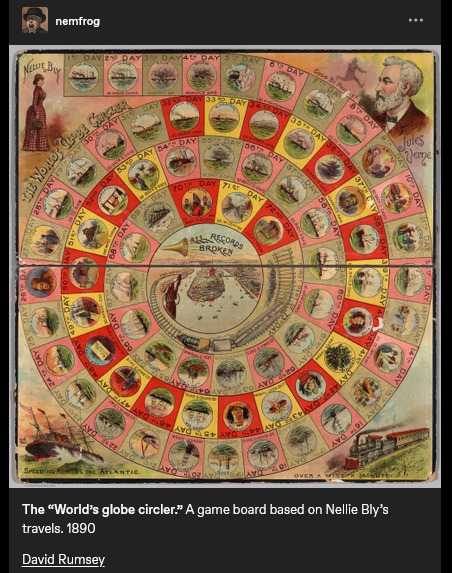
Caption reads: "The "World's globe circler." A game board based on Nellie Bly's travels. 1890." At center, a trumpet, and a proclamation: "ALL RECORDS BROKEN".
Same year that the United States "closed the frontier" and conquered "the Wild West" (the massacre at Wounded Knee happened in December 1890). A couple years later, the US annexed Hawai'i; by decade's end, the US military was in both Cuba and the Philippines. The Scramble for Africa was taking place. At the time, Britain especially already had a culture of "travel writing" or "travel fiction" or whatever we want to call it, wherein domestic residents of the metropole back home could read about travel, tourism, expeditions, adventures, etc. on the peripheries of the Empire. Concurrent with the advent of popular novels, magazines, mass-market print media, etc. Intrepid explorers rescuing Indigenous peoples from their own backwardness. Many tales of exotic allure set in South Asia. Heroic white hunters taking down scary tigers. Elegant Englishwomen sipping tea in the shade of an umbrella, giggling at the elephants, the local customs, the strange sights. Orientalism, tropicality, othering.
I'd lately been looking at a lot of work on race/racism and imperative-of-empire in British scientific and pop-sci literature, especially involving South and Southeast Asia. (From scholars like Varun Sharma, Rohan Deb Roy, Ezra Rashkow, Jonathan Saha, Pratik Chakrabarti.) But I'd also lately been looking at Mashid Mayar's work, which I think closely suits this kinda thing with the board games. Some of her publications:
"From Tools to Toys: American Dissected Maps and Geographic Knowledge at the Turn of the Twentieth Century". In: Knowledge Landscapes North America, edited by Kloeckner et al., 2016.
"What on Earth! Slated Globes, School Geography and Imperial Pedagogy". European Journal of American Studies 16, number 3, Summer 2020.
Citizens and Rulers of the World: The American Child and the Cartographic Pedagogies of Empire, 2022.
Discussing her book, Mayar was interviewed by LA Review of Books in 2022. She says:
[Quote.] Growing up at the turn of the 20th century, for many American children, also meant learning to view the world through the lens of "home geography." [...] [T]hey inevitably responded to the transnational whims of an empire that had stretched its dominion across the globe [recent forays into Panama, Cuba, Hawai'i, the Philippines] [...]. [W]hite, well-to-do, literate American children [...] learned how to identify and imagine “homes” on the map of the world. [...] [T]he cognitive maps children developed, to which we have access through the scant archival records they left behind (i.e., geographical puzzles they designed and printed in juvenile periodicals) [...] mixed nativism and the logic of colonization with playful, appropriative scalar confusion, and an intimate, often unquestioned sense of belonging to the global expanse of an empire [...]. Dissected maps - that is, maps mounted on cardboard or wood and then cut into smaller pieces that children were to put back together - are a generative example of the ways imperial pedagogy [...] found its place outside formal education, in children's lives outside the classroom. [...] [W]ell before having been adopted as playthings in the United States, dissected maps had been designed to entertain and teach the children of King George III about the global spatial affairs of the British Empire. […] [J]uvenile periodicals of the time printed child-made geographical puzzles [...]. [I]t was their assumption that "(un)charted," non-American spaces (both inside and outside the national borders) sought legibility as potential homes, [...] and that, if they did not do so, they were bound to recede into ruin/"savagery," meaning that it would become the colonizers' responsibility/burden to "restore" them [...]. [E]mpires learn from and owe to childhood in their attempts at survival and growth over generations [...]. [These] "multigenerational power constellations" [...] survived, by making accessible pedagogical scripts that children of the white and wealthy could learn from and appropriate as times changed [...]. [End quote.] Source: Words of Mashid Mayar, as transcribed in an interviewed conducted and published by M. Buna. "Children's Maps of the American Empire: A Conversation with Mashid Mayar". LA Review of Books. 11 July 2022.
Some other stuff I was recently looking at, specifically about European (especially German) geographic imaginaries of globe-as-playground:
The Play World: Toys, Texts, and the Transatlantic German Childhood (Patricia Anne Simpson, 2020) /// "19th-Century Board Game Offers a Tour of the German Colonies" (Sarah Zabrodski, 2016) /// Advertising Empire: Race and Visual Culture in Imperial Germany (David Ciarlo, 2011) /// Learning Empire: Globalization and the German Quest for World Status, 1875-1919 (Erik Grimmer-Solem, 2019) /// “Ruling Africa: Science as Sovereignty in the German Colonial Empire and Its Aftermath” (Andrew Zimmerman. In: German Colonialism in a Global Age, 2014) /// "Exotic Education: Writing Empire for German Boys and Girls, 1884-1914". (Jeffrey Bowersox. In: German Colonialism and National Identity, 2017) /// Raising Germans in the Age of Empire: Youth and Colonial Culture, 1871-1914 (Jeff Bowersox, 2013) /// "[Translation:] (Educating Modernism: A Trade-Specific Portrait of the German Toy Industry in the Developing Mass-Market Society)" (Heike Hoffmann, PhD dissertation, Tubingen, 2000) /// Home and Harem: Nature, Gender, Empire, and the Cultures of Travel (Inderpal Grewal, 1996) /// "'Le rix d'Indochine' at the French Table: Representation of Food, Race and the Vietnamese in a Colonial-Era Board Game" (Elizabeth Collins, 2021) /// "The Beast in a Box: Playing with Empire in Early Nineteenth-Century Britain" (Romita Ray, 2006) /// Playing Oppression: The Legacy of Conquest and Empire in Colonialist Board Games (Mary Flanagan and Mikael Jakobsson, 2023)
#mashid mayar book is useful also the Playing Oppression book is open access online if you want#in her article on slated globes mayar also mentions how european maps by 1890s provoked a sort of replete homogenous filling in of globe#where european metropole thought of itself as having sufficiently mapped the planet by now knit into neat web of interimperial trade#and so european apparent knowledge of globe provided apparently enlightened position of educating or subjugating the masses#whereas US at time was more interested in remapping at their discretion#a thing which relates to what we were talking about in posts earlier today where elizabeth deloughrey describes twentieth century US#and its aerial photographic and satellite perspectives especially of Oceania and Pacific as if it now understood the totality of the planet#ecologies#tidalectics#geographic imaginaries#mashid mayar#indigenous pedagogies#black methodologies#tigers and elephans#victorian and edwardian popular culture#my writing i guess
141 notes
·
View notes
Text
I'm too tired to gather my thoughts cohesively on this but.
The Anakt Garden bears a lot of resemblance to the Garden of Eden, right? The landscape is an ideal nature paradise and the humans kept within it are expected to live in blissful ignorance and obedience. It's not far-fetched to say that a lot of religious inspiration was taken when making the Anakt Garden considering the prevalence of "gods" and worship in the series. What's more, there is apparently a whole subject in the Anakt Garden dedicated to religion.
Through this Garden it's almost as if the aliens are attempting to recreate or rewrite the genesis of mankind now that they have established themselves as beings of power. The aliens tend to "play god", creating artificial humans and modifying existing ones in order to suit their needs.
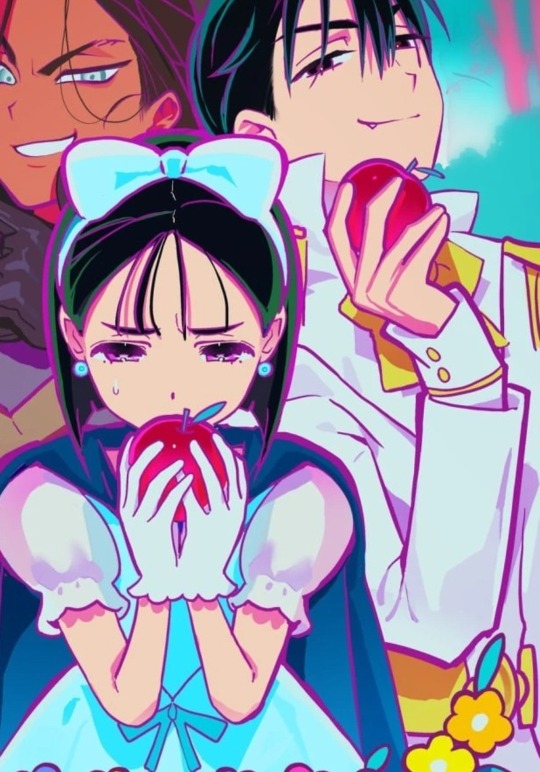
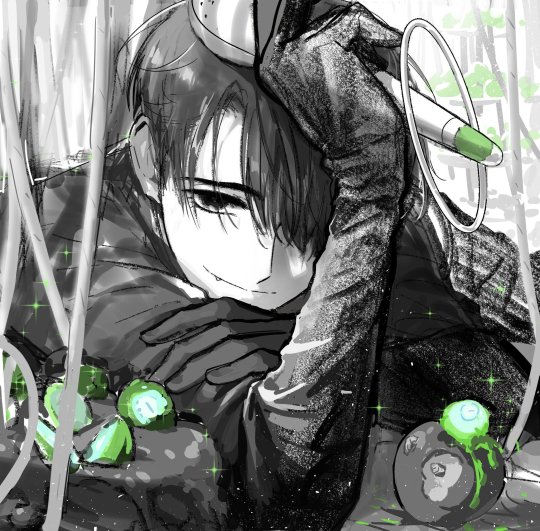
In past official arts, Sua and Ivan (two top students of Anakt Garden who know more about the truth of the system than they let on) have been depicted with apples. The same fruit that symbolizes disobedience and forbidden knowledge.
#alnst#alien stage#alien stage ivan#alien stage sua#i think a lot about how mizi lived blissfully ignorant of suffering and the truth#while sua who knew the true extent of alien cruelty simply lived alongside mizi and kept her knowledge secret in order to maintain a facade#i think about all the knowledge ivan has at his disposal. how hes able to do things and access places hes not supposed to#they're both completely aware of what had to happen and offered themselves in order to save their beloved from that fate#the curse of knowledge#its hilarious how im drawing these conclusions from completely unrelated official arts just HEAR ME OUT#para.musing
256 notes
·
View notes
Note
which touhou character would drive a toyota

ran yakumo 2003 toyota sienna road rage incident
#touhou#2023#this is a serious answer i think yeah either the yakumos (ran driving specifically bc yukari ismt trusted to drive) or the moriyas#if you think about it they have the closest access to cars i assume and also the knowledge to drive one#sanae only has her permit she keeps failing the test#also these cars are a toyota sienna and i think a toyota prius#the former of which my mom and everyone elses moms all drove from like 2003-2012 lmao#anyway what a hilarious ask lmao this sounds like it would come from my brother
540 notes
·
View notes
Text

my brother gave this to me for christmas :)
#It’s literally soooooooo good I love Perry Anderson so much#definitely one of the most beautiful & skilled academic writers I’ve ever read#I have to google the shit he says a lot but that’s part of the journey yanno#anyway really fantastic book. more accessible than the companion text to this imo#because he makes less assumptions about audiences’ historical knowledge about antiquity and early feudal Europe#so there is more description/context given. highly recommend
65 notes
·
View notes